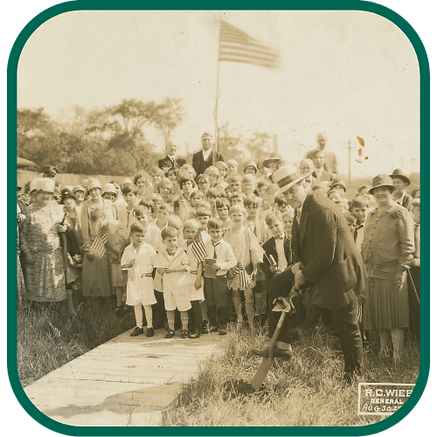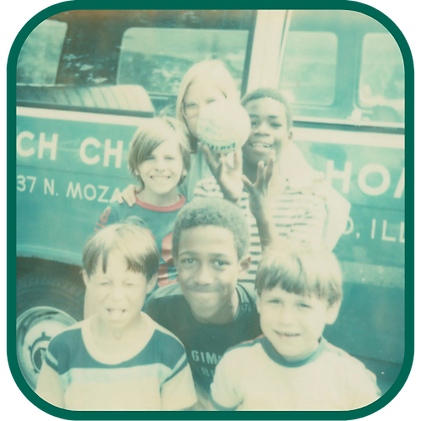OUR HISTORY
UCAN leads with transformational interventions so that families and communities can be safe and prosper.
UCAN is relentless.
UCAN's mission is to strengthen communities by supporting youth and families, offering a continuum of services for over 150 years.
UCAN’s expertise spans youth in care, youth development, mental health, therapeutic schools, workforce development, and violence prevention and intervention.
.webp)
The idea for an orphanage originated in 1866 by members of St Pauls UCC in Chicago who were committed to caring for youth whose fathers might not return home from the Civil War. St Pauls members raised $8,000 and their Women’s Auxiliary group founded a home for orphaned children that was situated on the northeast corner of LaSalle and Ontario Streets. It quickly outgrew its size and moved to a larger home on Clark Street between Garfield and Webster avenues. Christine Rathsfeld served as the home’s first matron and sole employee.
In 1867, St Pauls members Mr. and Mrs. Carl Uhlich donated a parcel of land to support the founding of a German children’s orphan home. The land was sold for $1 to the home, which is then named the Uhlich Evangelical Lutheran Orphan Asylum on September 19, 1867. It was officially incorporated in the state of Illinois on March 10, 1869, marking the beginning of UCAN as it’s known today.

On October 8th, 1871, St. Pauls UCC and the Uhlich Asylum were destroyed in The Great Chicago Fire. The following year ground was broken on a new home is built at 2014 N. Burling Street in an economically mixed but predominately German community. In 1873, the first wing of the new Uhlich Orphan Asylum was completed with additional space scheduled to be completed for the summer of 1889 with support from prominent Chicago businessman Charles Wacker.
For more than two decades in the 1870’s and 1880’s, Uhlich continued to service and be supported by the predominately German population that worshiped at St. Pauls. During this era there was a rise in settlement houses like Jane Addams Hull House and Chicago Commons that served a broader range of European immigrants.

By 1918, the Uhlich building on N. Burling had become overpopulated and rundown. In response, St. Pauls members Mr. and Mrs. Carl Buehler donated 10 city blocks near 3700 N. California Ave to establish a new Uhlich home and a facility for senior citizens. Ground was broken on August 26, 1927 on a new Uhlich Orphan Asylum located at 3720 N. California Ave. Shortly thereafter, Henry W. King, former president of the Chicago Federate Charities and an ordained congregational minister, was named superintendent of Uhlich (serving until his death in 1938). The new Uhlich home opened its doors on April 20th, 1928.
During the Great Depression, Uhlich staff worked tirelessly to reduce costs associated with feeding its youth, including preserving fruits and vegetables raised on the property. In 1935, as part of the Second New Deal, President Franklin D. Roosevelt signed the Social Security Act of 1935 into law, which authorized the first federal grants for child welfare services.
In 1938, sickness and tragedy struck the Uhlich home, as many of the 66 youth were afflicted with Pneumonia, Scarlet Fever, Chickenpox, Mumps and Measles. Also that year, both the Superintendent Henry King and Mrs. Martindale, the home’s matron, died, leaving Uhlich without leadership until Board Trustee Otto Closius took over.
That year, Uhlich acquired the Camp at Three Oaks in Koontz Lake, Indiana for $2,300 to be paid over five years. On August 18, 1938, more than 250 people took the 100-mile journey from Chicago to Koontz Lake to participate in a picnic to dedicate. The Uhlich girls went to Howell Village Cottages in McHenry, Illinois.
The Edward J. Abel Building, which featured a gym and woodshop, opened on December 15th, 1940 and provided Uhlich home youth with new options instead of relying on neighborhood parks (it would go on to become the administration headquarters until 2016). By 1947, the cost of operating Uhlich for one year totaled $83,680.64, or a per capita average monthly cost of $88.27 for each of the 79 children at the home. The following year the board approved its first official budget of $100,131 or approximately $97.03 per month per child.
On July 12, 1955, the Uhlich Orphan Asylum’s bylaws were changed to reflect automatic inclusion of the president of the Women’s Aid Society to the home’s board of managers.
In June 1957, Illinois Gov. William Stratton signed Senate Bill 91, which provided a payment of up to $60 per month for all youth in foster homes or in children’s homes like Uhlich.
During the 1950’s, Uhlich used a new emblem that was created specifically for Uhlich by Walt Disney Co.
During the 1960’s, hot dog icon Oscar G. Mayer was a consistent donor through stocks and cash gifts. Also, arriving from the Hershey School for Boys in Pennsylvania, E. Glenn Rogers was named the new superintendent of Uhlich. The Uhlich Board of Trustees voted to sell the property at 2359 S. Wentworth Avenue, the site of a Uhlich bequest, for $100,000 to the Chiam Restaurant. The Chinatown branch of the Chicago Public Library now sits on the site.
In 1964, the first African-American resident, a 13 year old boy from Evanston, Illinois, arrived at Uhlich.

By the 1980’s, Uhlich’s demographics were changing. Through primarily a foster care agency, gone were the days of only German immigrant youth. In 1987, Tom Vanden Berk joined the Uhlich family as CEO and throughout the next decades guided the agency through its evolution. On October 16, 1989, Vanden Berk launched his “continuum of care” concept to the board, which focused on working with youth and families to enhance the full spectrum of support and fluidity between programs that all share a common clinical philosophy. It is still in use today.

In 1993, Uhlich changed its name from Uhlich Evangelical Lutheran Orphan Asylum to Uhlich Children’s Home. In the 1990’s Uhlich expanded its focus to include gun violence, clinical and counseling services, teen parenting services and positive youth development. In 1997, Uhlich opens the Uhlich Academy, a therapeutic day school that still operates today.
In 1999, Uhlich achieved its first accreditation from the Council on Accreditation.
In 2002, Uhlich Children’s Home changed its name to Uhlich Children’s Advantage Network, and in 2004 it merged with FamilyCare of Illinois. Throughout the 2000’s, Uhlich continued to expand with its Career Development Program, FamilyWorks program, Alumni Services Program and the Teen Parenting Services Network Clinical. In 2012, Uhlich began offering Violence Intervention and Prevention Services.
Plans to move to relocate to a new location that’s more accessible to their clients begin in the mid-2000’s. Ground was broken on the new Drost Harding Campus in North Lawndale in 2013. The Diermeier Therapeutic Youth Home opened in 2016, followed by the Nicolas Center, the new administration headquarters, both of which make up the 7 acre campus.
